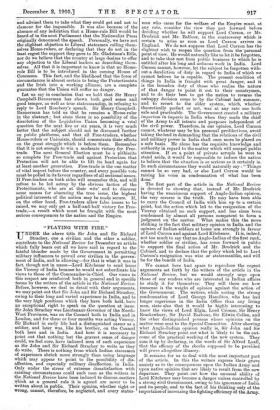man who cares for the welfare of the Empire must,
at any rate, consider the view they put forward before deciding whether he will support Lord Curzon, or Mr. Brodrick and Mr. Balfour, in the controversy which is certain' to arise. as soon as Lord Curzon arrives in England. We do not suppose that Lord Curzon has the slightest wish to reopen the question from the 'personal point of view. He would naturally like to let it be forgotten. and to take that rest from public business to which he is entitled after his long and arduous work in India. Lord. Curzon cannot, however, let the subject be forgotten with- out a dereliction of duty in regard to India of which we cannot believe he is capable. The present condition of things in India is fraught with great danger, and it is the bounden duty of those who realise the nature of that danger to point it out to their countrymen, and to do their best to get the nation to reverse the unhappy decision come to by the Cabinet last summer, and to revert to the older system, which, whether theoretically perfect or not, was at any rate one both safe and practicable. The Government created a military imperium in imperio in India when they made the chief of the Army to all intents and purposes independent of the civil power. Therefore, in our opinion, Lord Curzon cannot, whatever may be his personal predilections, avoid taking the lead in demanding that the relations of the civil and military power in India shall once more be placed. on a safe basis. He alone has the requisite knowledge and authority in regard to the matter which will compel public attention. If on a point of private scruple he were to stand. aside, it would ve impossible to induce the nation to believe that the situation is so serious as it certainly is. In such circumstances they would naturally say : " Things cannot be so very bad, or else Lord Curzon would be raising his voice in condemnation of what has been done.
The first part of the article in the National Review is devoted to showing that, instead of Mr. Brodrick having the unanimous support of Anglo-Indian opinion, the very reverse is the truth. He may have been able to carry the Council of India with him up to 'a certain point, but the action which led to the resignation of the Viceroy obtained no such support, and has since been condemned by almost all persons competent to form a judgment on the matter. What makes this the more striking is the fact that military opinion in India and the opinion of Indian soldiers at home are strongly in favour of Lord Curzon and against Lord Kitchener. It is, indeed, not too much to say that no Anglo-Indian of the first rank, whether soldier or civilian, has come forward in public to support the final action of Mr. Brodrick and the Cabinet, and to declare that the policy which led to Lord Curzon's resignation was wise or statesmanlike, and will be for the benefit of India.


































































 Previous page
Previous page